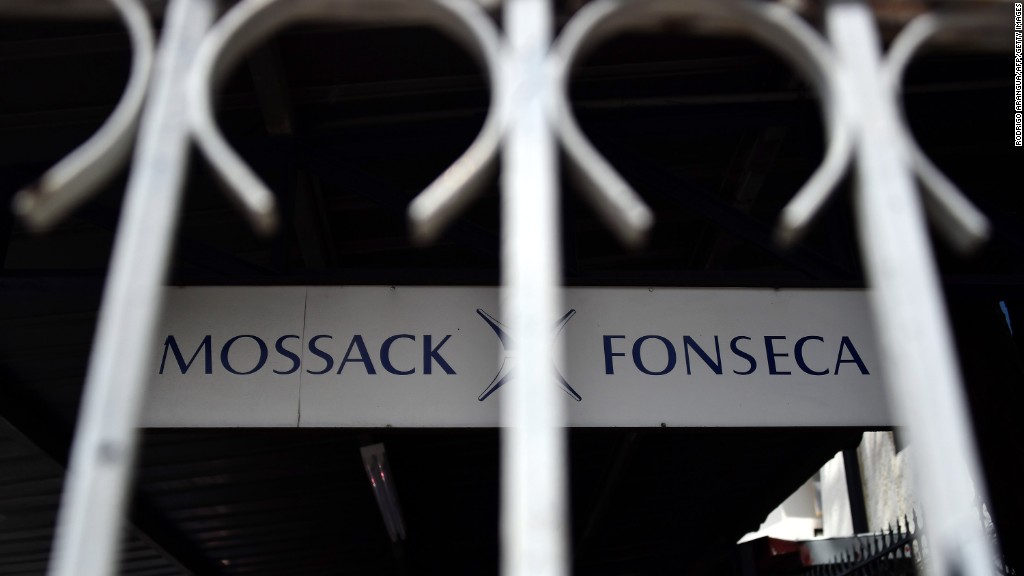
You're unlikely to have heard of Mossack Fonseca before today. Now the Panama law firm is a global name.
Reports published Sunday, based on leaked documents from the firm, allege it helped world leaders, officials and celebrities hide billions of dollars. Mossack Fonseca denies any wrongdoing.
So who is Mossack Fonseca, and why Panama?
Mossack Fonseca was created 30 years ago through a merger between two Panamanian law firms, one headed by Ramon Fonseca, the other by German immigrant Jurgen Mossack.
The firm specializes in helping clients incorporate firms in offshore jurisdictions.
Related: The murky world of offshore tax havens
Shell companies and offshore accounts are not illegal, but they can be used to mask the origin of financial transactions and ownership.
The reports, based on 11 million documents leaked from the company, claim Mossack Fonseca's clients included at least 33 people and companies blacklisted by the U.S. government because of links to drug trafficking and terrorism.
The International Consortium of Investigative Journalists, which coordinated the yearlong investigation into the leaked documents, described Mossack Fonseca as "one of the world's five biggest wholesalers of offshore secrecy."
Ramon Fonseca told CNN late Sunday that the information published about the firm was false. In a statement to CNN Monday, the firm said it had done nothing wrong, and the reports would create confusion about offshore finance.
In a detailed response to the ICIJ, the firm said many of the parties "are not and have never been clients of Mossack Fonseca."
"The facts are these: while we may have been the victim of a data breach, nothing we've seen in this illegally obtained cache of documents suggests we've done anything illegal, and that's very much in keeping with the global reputation we've built over the past 40 years of doing business the right way, right here in Panama," it told CNN.
Related: Rich and powerful respond to claims they hid billions offshore
The company also offers an array of other services, from handling trading permits and customs regulations, wealth management and immigration services, to registering yachts and private jets.
Global network
Mossack Fonseca has around 40 offices globally, including several in mainland China and others in countries and regions identified as tax havens by the European Commission, such as the Bahamas, British Virgin Islands, Seychelles, and Anguilla.
The leaked documents reveal the offshore holdings of individuals and companies from more than 200 countries and territories.
The ICIJ said the firm's controls were inadequate. "The leaked files show that in some cases Mossack Fonseca's loose procedures allowed blacklisted individuals and other questionable clients to slip by without the firm itself knowing who they were."
The firm told the ICIJ it carried out due diligence procedures in accordance with the law.
Related: Rich and powerful respond to claims they hid billions offshore
High risk location
Until February, Panama was on an international watchlist of countries with weak anti-money laundering laws. And global organizations are still concerned about its legal framework.
"The 'Panama Papers' revelations have shone the light on Panama's culture and practice of secrecy," said Angel Gurría, secretary general of the OECD, in a statement Monday.
"Panama is the last major holdout that continues to allow funds to be hidden offshore from tax and law enforcement authorities," he added.
The International Monetary Fund said two years ago that Panama's open economy, strategic location, and developed offshore financial services sector put the country at a high risk of being used for money laundering.
The small central American country has been one of the fastest growing economies in the world, and a champion in the region. Data from the IMF show it grew 6% last year and it's forecast to exceed that this year, and next.
Financial services is the biggest local industry. The Panama Canal is also crucial to the economy, generating around 6% of the country's GDP, according to official documents.
Panama's low taxes and favorable visa system make it a popular retirement destination.
-- Jethro Mullen contributed to this article.
